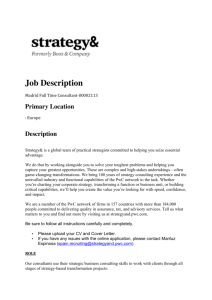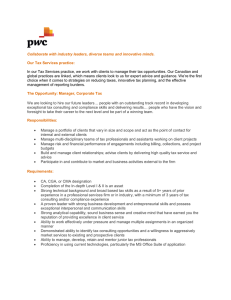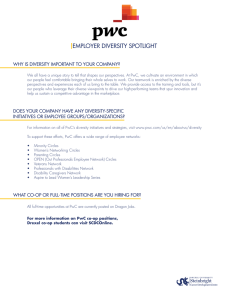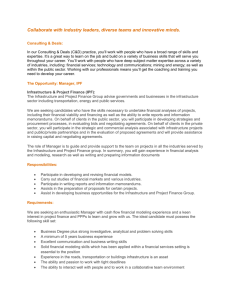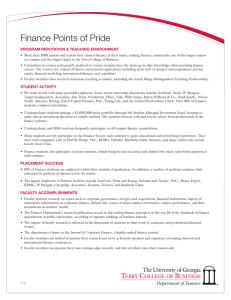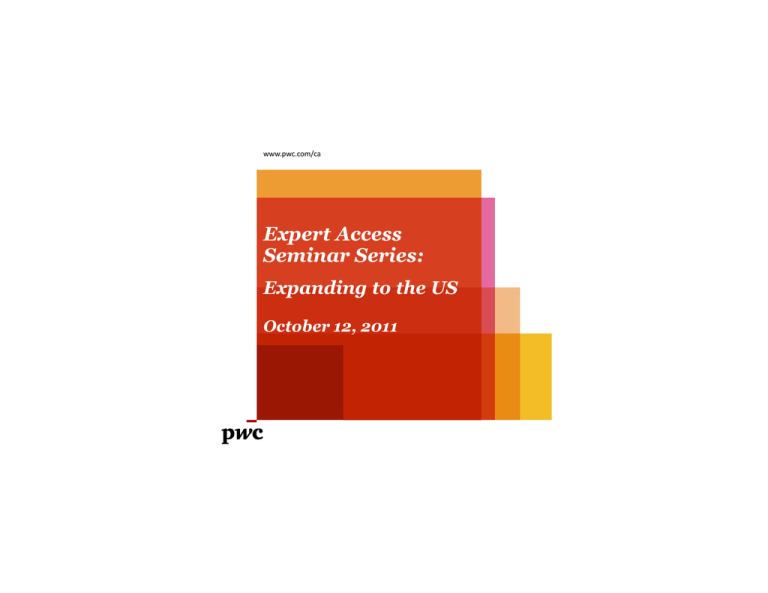
www.pwc.com/ca
Expert Access
Seminar Series:
Expanding to the US
October 12, 2011
Introductions
Melanie Kurk, Senior Manager
416 869 8777
melanie.kurk@ca.pwc.com
• Melanie has CA (Ontario) and CPA (Ohio) designations as well as a
Bachelor of Arts in Business-Accounting and a Masters of Science
in U.S. Taxation.
• Melanie has worked in PwC's US/International Tax group for more
than 15 years. Prior to that, Melanie worked in Cleveland, Ohio,
both in tax in public accounting and in industry.
• Melanie specializes in assisting clients with U.S. federal and state
taxation matters relating to the technology industry and ownermanaged companies conducting business in the U.S.
PwC
2
Course Objectives - US Tax
• Create awareness of circumstances that give rise to
U.S. federal and state taxation for Canadian
businesses operating in the U.S.
• Create a basic understanding of U.S. federal income
taxation of non-residents and impact of the CanadaU.S. Treaty
• Create a basic understanding of various types of state
taxes in the U.S. - income, franchise, margins, and
sales tax
PwC
3
Agenda
1.
U.S. federal taxation of non-residents
Taxation of investment income (Fixed or Determinable, Annual or
Periodic (“FDAP”))
Taxation of business profits (Effectively Connected Income (i.e. Trade
or business income))
Branch vs. Subsidiary
2.
U.S. state taxation
Nexus
Types of Taxes
Other issues
PwC
4
U.S. federal taxation of non-residents
Taxation of investment income
(FDAP))
PwC
5
U.S. taxation of non-residents
Fixed or Determinable, Annual or Periodic Income (“FDAP”)
• U.S. source “gross” investment type income
• Taxed at 30% rate
• Reduced under applicable treaty
• Interest, dividends, rents, royalties, etc.
• Must be U.S. source
PwC
6
Withholding tax rates under the Canada-U.S. tax
Treaty
Cross-border charges
• Dividends – 5 or 15%
• Interest – 0%
Fifth Protocol: arm’s length 0%; related party phase-out – 7% in
2008, 4% in 2009, 0% thereafter; prior to Fifth Protocol:
10%
• Royalties – 0 or 10%
• Rents (real property) – 30% (or net election)
• Rents (other) – 10%
• Management charges – 0%
PwC
7
Request for reduction in
withholding tax rates
under Treaty
Form W-8 BEN
Individuals, Corporations
Form W-8IMY
Partnerships, Trusts
Form W-8ECI
Trade or Business in U.S.
PwC
8
U.S. taxation of non-residents
Taxation of business profits
connected with a U.S. trade or
business
PwC
9
Liability for U.S. taxation
A Canadian company is subject to U.S. tax on business profits in the U.S.
if:
• Carrying on U.S. trade or business; and
• Has income effectively connected with U.S. trade or business.
UNLESS: Canco can obtain relief under the Canada-U.S. Tax Treaty
(“Treaty”).
(i.e.Canco does not maintain a U.S. permanent establishment per the
Canada-U.S. Tax Treaty (“Treaty”) AND is eligible to claim Treaty benefits
(need to analyze the Limitation of Benefits Article XXIX-A of the Treaty).
PwC
10
U.S. Federal Taxation
“Carrying on U.S. trade or business”
• Very low threshold test
• Determined on a case-by-case basis
• Canco may be deemed to be carrying on U.S. trade or business in the
U.S. if Canco regularly and continuously transacts business in the
U.S. (e.g. frequent attendance at trade shows where sales made to
U.S. customers)
PwC
11
U.S. Federal Taxation
Effectively Connected Income (ECI)
• U.S. trade or business generates U.S. source income
• Income from services
• Sale of inventory
PwC
12
Canada – U.S. Treaty
Permanent Establishment (“PE”)
Canadian company’s business profits are subject to U.S. taxation to the
extent attributable to a U.S. PE.
Definition of PE:
• Canada-U.S. Treaty defines PE as specifically including the following
(among other items):
1.
A fixed place of business in the U.S. that includes: office, a
place of management, construction site lasting at least 12
months;
2. An employee who has, and habitually exercises, the authority
to conclude contracts in the name of the Canadian principal.
3. Services PE (discuss later in the slide)
PwC
13
Canada-U.S. Treaty
Permanent Establishment (PE) (cont’d)
Canada–U.S. Treaty specifies that PE does not include:
• A warehouse or use of facilities for storage, display, or delivery or
processing by another person;
• The purchase of goods or collection of information;
• Advertising;
• Use of dependent sales representatives (employees of Canco) without
the authority to contract;
• A U.S. subsidiary; or
• Independent agents of brokers acting in the ordinary course of their
business.
PwC
14
Canada-U.S. Treaty-New Deemed Services PE
A PE in the U.S. is deemed to exist if either Test 1 or Test 2 is met.
Test 1 – if both conditions are met:
• Services performed by Canadian individual present in the U.S. for >183 days
in any 12-month period; and
• In the same period, more than 50% of gross active business revenues are
derived from services performed in the U.S.
Test 2 – if both conditions are met:
• Services provided by Canadian company in the U.S. for >183 days in any 12month period; and
• Services provided with respect to same or connected projects for customers
who are either resident or have a PE in the U.S. and the services are provided
in respect of that PE.
Effective date – 2010.
Issue for service businesses (e.g. consulting, training, engineering et c.) with
PwClong-term contracts.
15
Employee Filing Requirements
Application of Treaty
• Exemption available if meets criteria of Article XV, Canada-U.S. Tax
Treaty (Treaty):
Remuneration <$10,000USD; or
Present in the U.S. in any 12 month period beginning or ending in
the fiscal year for <183 days and the remuneration is not paid by
or on behalf of a person who is a resident of the U.S. and is not
borne by a permanent establishment (PE) in the U.S.
• Not all states follow the Treaty
• File appropriate personal tax forms (e.g. Forms 1040, 1040NR, 8823)
• Watch U.S. federal, states, city, payroll withholding, and FICA taxes
PwC
16
Canada - U.S. Treaty
Permanent Establishment (PE)
E-Commerce issues:
• Computer equipment (i.e. a server), owned or leased by Canco
located in the U.S. may constitute a U.S. PE (including automated
equipment not requiring on-site personnel.
• An internet web-site does not constitute a PE.
• A web-hosting arrangement generally does not result in a PE for
enterprise paying for space on a server it does not own.
• For equipment to constitute a PE it must be “fixed” for a sufficient
period of time (e.g. 6 months).
• ISP not a PE of an enterprise that conducts business through a web
site hosted on a server owned by the ISP.
PwC
17
Canada-U.S. Treaty
Permanent Establishment (PE) (cont’d)
If no U.S. PE exists:
• Canco claims treaty protection by filing a U.S. Treaty-based federal
return on Form 1120F and attaches Form 8833.
• Benefits of filing a U.S. Treaty-based return
1. Penalty for failure to disclose is $10,000 per instance.
Increased IRS scrutiny of Treaty-based returns and nonfilers).
2. A U.S. Treaty-based return serves as a protective election.
Reserves the right to claim and credits against income if
the IRS determines PE exists.
PwC
18
U.S. Federal Taxation - Summary
Taxed on
investment
income only1
No U.S. trade or
business
Canco
No PE
Business profits
exempt under
Art. VII
Yes PE
Canco taxed in
U.S. on
business profits
U.S. trade or
business
1
Investment income (interest,
dividend, etc.)
Subject to withholding tax
PwC
19
U.S. Federal Taxation - Branch
If U.S. PE Exists:
• U.S. branch income is subject to U.S. corporate income tax at
graduated rates ranging between 15-35 per cent.
• Allocation of revenue and expenses to U.S. branch is essentially cost
accounting exercise.
• In lieu of withholding tax on a dividend, the IRS imposes complex
system of branch taxation on two separate tax bases:
Profits from Canco’s branch operations that are deemed
repatriated from the U.S. under the branch profit tax rules; and
Excess interest that is apportionable to income of Canco.
PwC
20
U.S. Federal Taxation - Branch
Branch profits tax
• Applied to after-tax earnings to the extent that Canco does not
reinvest these earnings in the U.S. branch.
• IRS imposes the branch profits tax at 30% (reduced to 5% USCanada Treaty) and is in addition to the regular corporate income
tax.
• Canada-U.S. Treaty and U.S. domestic tax law provides for
exclusion from branch profit tax on first CA$500,000 of branch’s
income.
PwC
21
U.S. Federal Taxation - Branch
Advantages
• Start up losses of the U.S. branch are deductible against Canadian
taxable income.
Disadvantages
• U.S. transfer pricing rules do not apply to U.S. branch (uncertainty
involving cost allocations).
• U.S. branch, as non-corporate entity, cannot deduct payments for
royalties, management fees or interest to its Canadian headquarters.
• Inability for Canadian tax purposes to transfer assets of U.S. branch
to U.S. subsidiary on tax deferred basis.
• State tax return considerations.
PwC
22
U.S. Federal Taxation – using a U.S. Subsidiary
General overview
• Two levels of tax: corporate and shareholder
• Taxable income of U.S. Sub subject to corporate income tax rates
ranging from 15 to 35 percent.
• US Sub able to deduct payments made to Canco for royalties
(subject to withholding tax) and interest.
• Payment of management fees by U.S. Sub to Canco will not incur
withholding tax.
• U.S. Sub incurs 5% withholding tax when repatriating cash dividend
to Canco.
• Ensure all U.S. activities conducted through U.S. subsidiary to avoid
“inadvertent U.S. PE”.
PwC
23
U.S. Federal Taxation – using a U.S. subsidiary
(cont’d)
Distributions from U.S. subsidiary to Canco
• Concept of earnings and profits (“E&P”)
• Cash distribution to extent that E&P (first current, then
accumulated) is a dividend and subject to 5% U.S. withholding tax
• Distributions in excess of E&P are tax-free return of capital of U.S.
Sub
• Any excess in return of capital is a capital gain
Financing a U.S. subsidiary
• Debt vs. Equity
• Earnings stripping rules and debt-equity ratio of 1.5:1 (safe harbor)
PwC
24
U.S. Federal Taxation – Pros & Cons of a U.S.
Subsidiary
Advantages of a U.S. subsidiary
• Accounting is simplified (avoid branch accounting);
• Possible to delay withholding tax until a distribution is made.
• Possible to avoid the 5% withholding tax on dividends upon
liquidation.
• Financing options available.
• Possible to deduct various intercompany charges (may be subject to
withholding tax).
• Business reasons – a U.S. subsidiary preferred in the U.S. market
place.
Disadvantages of a U.S. subsidiary
PwC
• U.S. losses cannot be deducted against Canadian source profits.
25
U.S. Federal Taxation
Where to incorporate a U.S. subsidiary?
Why Delaware is popular state of incorporation:
• Delaware law permits anonymity and does not require either the
disclosure or publication of the names of shareholders.
• One person can hold all corporate offices and be the sole director.
That person need not be a shareholder.
• Annual corporate franchise tax in Delaware is as low as $50 per
year.
• Delaware does not require that any shareholder meetings occur in
Delaware or that corporate records be maintained in Delaware.
• Delaware’s Courts have reputation of being pro-business.
26
U.S. Federal Taxation
Where to incorporate a U.S. subsidiary (cont’d)
• Delaware does not have a corporate income tax for corporations not
transacting business in State of Delaware.
• Shareholder and director meetings are not necessary as Delaware
permits shareholders and directors to act by written unanimous
consent.
• Delaware law permits special provisions in By-Laws and Certificate
of Incorporation that will exculpate officers and directors from
personal liability.
• No shareholder consent required to make or alter by-laws.
• Delaware does not require shareholders to be either U.S. citizens or
residents. Delaware does not require minimum capital.
27
Transfer Pricing Rules
The intercompany transactions between Canadian and a U.S. subsidiary
must be “arm’s length”
• Contemporaneous documentation is required
• Where executives are employed by one legal entity, but perform
work that benefits a related entity in another country, transfer
pricing rules require a service charge between the entities
• Often, management-type services are charged on a “cost-plus”
basis, where the “plus” (if any) is an arm’s length profit mark-up;
some services may not require a mark-up
• Where mark-ups are required, these are usually benchmarked
against profits earned by comparable independent service
providers
PwC
28
Example number one:
CANCO
(e-business)
CANCO contracts with all U.S. customers
Cda
U.S.
U.S. customers
USCO
• CANCO bears risk of non-performance through contracts with U.S.
Customers.
• Contract-manufacture or sales company relationship between CANCO
and USCO.
• Compensate USCO for services (cost + %).
29
Example number two:
Cdn SH # 1
Cdn SH # 2
Cdn SH # 3
CANCO
Cda
Royalty
Management
Fee
U.S.
Distribution
Agreement
USCO
PwC
30
U.S. State Tax Issues
PwC
31
Agenda
PwC
•
Current state tax environment
•
International treaties
•
Nexus – what is it?
•
State income tax
•
Sales and use tax
•
Franchise tax
•
Non-traditional state taxes (Michigan, Ohio, Texas)
•
Other state tax issues
32
Current State Tax Environment
• U.S. states are on verge of bankruptcy and are looking for ways to
reduce or eliminate cash shortfall.
• In order to raise more revenue:
States have become more aggressive in catching taxpayers that are
non-compliant;
Some states are changing from an income tax to a gross receipts tax;
Some states have broadened the tax base; and
States are requiring unitary or combined returns.
PwC
33
State Treatment of U.S. Tax Treaties
• States are not “party to” or “bound by” tax U.S. Treaty provisions.
• Examples of states that do not follow the Canada-U.S. Treaty:
Arizona, California, New Jersey, New York, Pennsylvania.
• Others do not follow due to franchise/excise component:
Kentucky, Massachusetts, Ohio.
• Examples of states that do follow the Treaty:
Florida, Illinois, Maine, South Carolina.
PwC
34
Nexus – what is it?
• Differs from PE concept.
• A state has jurisdiction to tax a corporation organized in another
state only if the out-of-state corporation’s contacts with the state are
sufficient to create nexus.
• Physical presence within a state is an essential prerequisite to
establishing nexus (e.g. Footprint).
• Differs for each type of state tax – income tax, sales tax, franchise
tax.
PwC
35
U.S. State Income Tax
PwC
36
Types of State Tax
State income tax nexus
• State’s power to tax limited by the U.S. Constitution, PL 86-272,
state constitutions and respective statutes.
• State tax rates range from 0% to 11%.
• Highest state tax nexus threshold.
• Income tax nexus – created by physical presence of employees
services such as training, consulting, repair/maintenance.
maintaining property in-state (e.g. inventory, owned or leased
property).
PwC
37
Nexus – Protective Activities
PL 86-272 – U.S. federal law (does not apply to non-U.S.
corporations)
• Applies to sales of tangible personal property only.
• Does not apply to sales, franchise and other taxes unless the state so
chooses.
• Prohibits income tax if in-state activities are limited to mere
solicitation of sales of tangible personal property, and orders are
approved and shipped from outside the state.
PwC
38
Advanced Nexus Concepts
Agency nexus – independent contractors
• Example – Canco conducts business through independent agents.
• Does use of independent agents, rather than employees allow
corporation to avoid nexus?
• Scripto case – critical issue is whether the activities performed in the
state by the independent contractors on behalf of the taxpayer
helped establish and maintain a market for Scripto goods in this
state. Florida Supreme Court held yes and Scripto had nexus in
Florida.
• Public Law 86-272 and independent contractors.
• Watch-out for affiliate / agency nexus.
PwC
39
Advanced Nexus Concepts (cont’d)
Economic nexus
• General rule is physical presence.
• Geoffrey v. South Carolina – held that a Delaware trademark
holding company that licensed its intangibles for use in South
Carolina had nexus for income tax purposes despite lack of any
tangible property or employees in South Carolina.
• Geoffrey was trademark holding company for toy retailer Toys R
Us. Geoffrey domiciled in Delaware and had license agreement with
South Carolina retailers allowing them to use the Toys R Us
trademark.
PwC
40
Advanced Nexus Concepts (cont’d)
Economic nexus (Cont’d)
• Court held – licensing intangible for use in the state was sufficient
to satisfy nexus requirements for South Carolina.
• Created nexus because court held intangibles were integral part of a
business carried on within the states.
• Besides South Carolina, other states have adopted the Geoffrey rule
in their state statutes – for example New Jersey, Florida and
Massachusetts.
PwC
41
Common Nexus Creating Activities for State
Income Tax
• Sales of any services
• Resident employees (unless meeting certain exemptions)
• Consigned inventory in a state
• Demo equipment at a customer site
• Tooling, dies and special tools in a state
• Rented space, even shared space, including servers
• Quality control and inspection activities
• Warranty or repair services, even by third party
• Installation/implementation services (e.g., hardware/software)
PwC
42
US State Sales Tax
PwC
43
Sales Tax
• Imposed by 45 states, and 7,000 + local jurisdictions
• Sales tax rates range from 0 to 11%
• Major source of revenue for most states
• Little conformity or consistency
• Not Treaty protected
• Not Public Law 86-272 protected
PwC
44
Sales Tax Cont…
• When is sales tax imposed?
• Low nexus threshold
Transaction tax - Imposed on sale/transfer of title and/or
possession of tangible personal property and specified services.
• Who is liable for the tax?
Purchaser is liable for the tax
Seller is agent of the state in collecting the tax
Seller and buyer share joint and several liability for remitting
tax to the state
Contractual language placing sales tax burden on purchaser
irrelevant to state tax authorities
Compliance is often required even if no tax is due
PwC
45
Sales tax
Possible exemptions - exempt transactions and
customers
• Exempt transactions – resale, manufacturing.
• Exempt customer – sale to government agencies or non-profits.
• Relevant resale/exemption certificates needed and kept on file –
may obtain blanket certificates.
Some state governments don't issue certificate - purchase order
sufficient.
• Exemptions vary from state to state.
• Returns may be required even if no tax due.
Failure to file sales tax returns – exposed to penalties (most based
upon sales tax owing) + statute of limitations is open.
PwC
46
Top Sales Tax Oversights
1.
Activities conducted by third parties can create nexus.
2. Nexus can exist even if no PE under Canada – U.S. Treaty.
3. Returns may be required even if no tax is due.
4. Failing to register for sales tax with state tax authorities.
5. Not securing exemption certificates/resale certificates from
customers.
6. Not collecting sales tax or, worse, not remitting collected sales
tax.
PwC
47
Sales Tax & Software – canned vs. custom
• Custom designed software – generally treated as a service for state
sales tax purposes.
Sales tax will generally not apply to customer designed software,
regardless of format of transfer.
• Canned software - generally treated as tangible personal property for
state sales tax purposes.
If the canned software is NOT transferred electronically, it is
subject to sales tax. If transferred electronically, it is generally
exempt from sales tax, but need to check each state.
PwC
48
Sales Tax & Software – canned vs. custom
Example
A customer is considering purchasing software from CANCO. The total
software package combines designed software used in conjunction with
canned software. The custom designed software is 65% of the package and
the canned software is 35% .
1.
Is the service for developing custom software a taxable
transaction?
2. Is the canned software taxable?
3. If the systems are billed together, does the presence of the canned
software affect the taxability of the customer software?
PwC
49
US Franchise Tax
PwC
50
Types of Tax
Franchise/capital tax
• “Privilege” tax
• Generally based on capital stock or net worth
• Lowest nexus standard
• Qualifying or registering to do business is a legal act
• Rates vary
PwC
51
Non Traditional State Taxes
PwC
52
Types of Tax
Non traditional state taxes
• Michigan Business Tax
• Ohio Commercial Activity Tax (CAT)
• Texas Margins Tax
PwC
53
Non Traditional State Taxes – Michigan Business
Tax (“MBT”)
• Effective January 1, 2008 – replaced SBT
• Combined filing required
The MBT consists of :
(1) Business income tax
BIT is imposed on taxpayers with "business activity" in the state.
Business activity is defined broadly for this purpose.
BIT equals 4.95% of a taxpayer's business income tax base, which is the
portion of U.S. federal taxable income derived from business activity
with certain modifications.
and
PwC
54
Non Traditional State Taxes – Michigan Business
Tax (cont’d)
(2) Modified Gross Receipts Tax
• The GRT is 0.8% of a taxpayer's gross receipts tax base, which
generally includes gross receipts less purchases.
• The GRT is imposed on taxpayers with Michigan nexus (“bright-line
test”):
the taxpayer has physical presence in Michigan for more than one
day in the year; OR
actively solicits sales in Michigan and has Michigan-source gross
receipts of $350,000 or more in the year.
• Foreign Reciprocity Exemption for Treaty Based Filers.
PwC
55
Non Traditional State Taxes – Michigan Business
Tax (cont’d)
Updates
• Effective 1/1/2012, Michigan Corporate Income Tax (CIT) will
replace the MBT, except for certain businesses that wish to retain
certain certificated credits.
• The CIT is comprised of three separate taxes: a corporate income
tax, a premiums tax on insurance companies, and a franchise tax
on financial institutions.
• Similar “bright-line tests “ apply as that of MBT
• The CIT tax base is federal taxable income subject to specified
additions and subtractions.
• CIT rate is 6% of the CIT tax base after allocation or
apportionment.
PwC
56
Non Traditional State Taxes – Ohio Commercial
Activity Tax
• The Ohio Commercial Activity Tax ("CAT") is an annual privilege
tax measured by "taxable gross receipts" from most business
activities.
• The CAT applies to gross receipts sourced to Ohio.
• Most receipts generated in the ordinary course of business are
subject to the CAT.
• The CAT applies to most businesses including but not limited to
retail, wholesale, service, manufacturing, and other general
businesses.
• CAT return – prepared by taxpayer.
PwC
57
Non Traditional State Taxes – Ohio Commercial
Activity Tax (cont’d)
• An out-of-state business is required to register and pay the CAT if the
business meets any of the following:
Taxable gross receipts in the year are at least $500,000
Property in the state during the year is at least $50,000
Payroll in the state is at least $50,000, or
Has at any time during the year within the state of Ohio at least
25% of its total property, payroll or total sales.
• The tax was phased in over 5 years. It was fully phased after March
31, 2009.
• No Ohio Franchise Tax filings starting with 2010 due to CAT
replacing it.
PwC
58
Non Traditional State Taxes – Texas Margin Tax
• Effective January 2007-replaced Franchise Tax.
• Calculation of the tax:
Step 1 - determine the "taxable margin". "Taxable margin" is
the lower of (1) 70% of total revenue of the business;(2) total
revenue of the business minus COGS; or (3) total revenue of the
business less compensation and benefits.
Step 2 - application of the rate – the tax rate on the "taxable
margin“ is 1% for most business. Business primarily engaged in
wholesale or retail will apply a tax rate of .5%.
• Entities with gross revenues less than $300,000 or tax liability of
less than $1,000 will not be taxed.
• De-facto follows the Treaty.
PwC
59
Other US State Tax Issues
PwC
60
Risk of Non-Filing
• Reps and warrants for financing or funding
• Financial statements may be incorrect
• If non-filing, statutes of limitation do not start running
• Need state tax clearance to spin off, sell or IPO the U.S. operations
• May need tax clearance for preferred vendor status
• Officer liability for some types of tax
• Penalties and interest can be substantial
PwC
61
How Canadian Companies Get Caught
• Information sharing
• Request for websites on tax return forms
• Customs activity
• Nexus squads/discovery activity
• IRS and state memos of agreement
• Internet browsing – California, New Mexico
• Customer audits
• Weigh stations
• Nexus mailings/questionnaires
PwC
62
PwC
63
Technology Industry Specific Issues
• Leasing a server in a state
• Stored inventory or consigned inventory
• Contracts including software, services and maintenance
• Contractually assigning sales tax
• Downloaded or digital delivered product
• Services in state such as training, consulting, or installation
• Maintenance contracts
PwC
64
The Perfect World State Tax Progression
• Qualify with Secretary of State to do business
• Register with Department of Revenue for state income,
employment, franchise and/or sales tax, if applicable
• Begin conducting business in-state
• Determine nexus and tax filing requirements
• Collect and remit sales tax, if required
• File income tax returns on a timely basis
• Review business activity on a regular basis
PwC
65
Nexus Quiz
• CANCO’s only activity in Michigan is sales people entering the
state to sell product. Contracts are concluded and approved and
fulfilled from Canada. Does CANCO have nexus?
• CANCO has a US domestic subsidiary which houses US resident
employees. However, the signatory party on the contracts is
CANCO and CANCO employees help with implementations in the
US. Does CANCO have nexus?
• CANCO has demo equipment at client locations in various states.
Does CANCO have nexus?
PwC
66
Nexus Quiz (cont’d)
• CANCO sells software (tangible personal property) but uses either
CDN or contract personnel to train and handle implementation at
client locations. Does CANCO have nexus?
• CANCO uses independent salespeople’s home addresses on their
website as “US locations”. Does CANCO have nexus?
• CANCO provides services via internet or web based product but has
sales people traveling around US as part of the marketing program.
Does CANCO have nexus?
• CANCO says that title passage to products sold into the US takes
place in Canada, however, CANCO is the importer of record for US
Customs purposes. Does CANCO have nexus?
PwC
67
Contact any one of our local PwC tax specialists for more information:
Andy McAskile
Debra Baker
Partner
416 869 8725
Nexus Navigator
Partner
416 814 5759
andrew.mcaskile@ca.pwc.com
Nadia Manin
debra.baker@ca.pwc.com
Helping Canadian companies navigate
the complex realities of US state and
local taxes
Melanie Kurk
Associate Partner
416 869 2687
Senior Manager
416 869 8777
nadia.manin@ca.pwc.com
melanie.kurk@ca.pwc.com
48 States Face Budget Shortfalls in Fiscal 2011.
How can it impact you?
WA
MT
ME
ND
OR
MN
ID
WY
NV
CA
SD
WI
CO
AZ
NM
IL
KS
OK
IN
MO
PA
OH
KY
DE
WV
VA
VT
NH
MA
RI
CT
NJ
MD
NC
TN
AR
SC
MS
TX
AK
MI
IA
NE
UT
NY
AL
GA
LA
FL
HI
© 2009 PricewaterhouseCoopers LLP. All rights reserved. “PricewaterhouseCoopers” refers to PricewaterhouseCoopers LLP, an Ontario limited liability
partnership, or, as the context requires, the PricewaterhouseCoopers global network or other member firms of the network, each of which is a separate
and independent legal entity.
PwC
68
www.pwc.com/ca
Impact of Doing
Business in the US on
Deals
October 12, 2011
Introductions
Craig Hanna,
Vice President PricewaterhouseCoopers
Corporate Finance LLC* & PwC Deals
+1 416 947 8923
craig.hanna@ca.pwc.com
• Craig is a Vice President with PwC Corporate Finance based in
Toronto. Corporate Finance is within the PwC Deals practice that
includes transaction services, valuations, restructuring and
infrastructure/project finance.
• Craig specializes in advising middle market technology clients on
mergers, acquisitions, divestitures and financing.
• Craig has a Master of Business Administration from the DeGroote
School of Business at McMaster University and a Bachelor of Applied
Science in Engineering from Queen’s University.
PwC
*PricewaterhouseCoopers Corporate Finance LLC is owned by PricewaterhouseCoopers LLP, a Delaware limited liability partnership and a
member firm of PricewaterhouseCoopers International Limited. Each member firm of PricewaterhouseCoopers International Limited is a
separate legal entity.
PricewaterhouseCoopers Corporate Finance LLC is a member of FINRA and SIPC and is not engaged in the practice of public accountancy.
70
Impact of doing business in the US on
deals (M&A, IPO, JV)
PwC
71
Impact of cross-border sales on deals
Does expanding your business into the US impact a potential exit?
How
does expanding
your
Absolutely.
100%. Every
time.business into the US impact a
potential exit?
Quantitatively:
-
Higher valuations
-
Valuations are impacted by the size of the business at exit,
competition for your deal, investor knowledge and analyst
coverage.
Qualitatively:
-
PwC
Exposure to potential acquirers and/or investors
-
Building relationships with potential buyers months or years in
advance of a transaction.
-
Reach the size to attract attention.
72
Valuation
The impact of deal size on price premium
•
Across all verticals and sectors within software, software services and
hardware, deal size significantly impacted valuations.
•
In the over 500+ deals we’ve tracked during the past 12 months with
published deal metrics (normalized for pre-revenue and blockbuster
deals), we observed a significant premium for deals above $50
million:
•
PwC
•
Deals under $50 million had an average Enterprise Value to
Revenue multiple of nearly 2.0x; while
•
Deals $50 million and above had an average multiple of nearly
3.5x and the median EV/EBITDA multiple was 4 turns higher.
M&A deals involving a public company exhibited a similar trend
whereby public targets, on average, were valued at 1.5 turns higher
than their private counterparts.
73
Exposure to acquirers and investors
The impact of cross-border sales on getting a deal done
•
M&A is still the preeminent exit strategy for Canadian technology
business owners/investor – over 80% of respondents from the PwC
2010 Technology CEO survey agreed (up from 73% in 2009).
•
In addition to the strategic reason for expanding into the US, or
internationally, doing so can improve the prospects of a successful exit
by providing:
•
PwC
•
Exposure to new customers or partners who are the most likely
potential acquirers; and
•
Growth opportunities which can position a business above the
minimum thresholds for some serial acquirers or PEs.
The prospect of US customers also impacts non-monetary deal
consideration during a buyer’s/investor’s due diligence and their
perception of risk from customer concentration or exposure to
potential tax liabilities.
74

